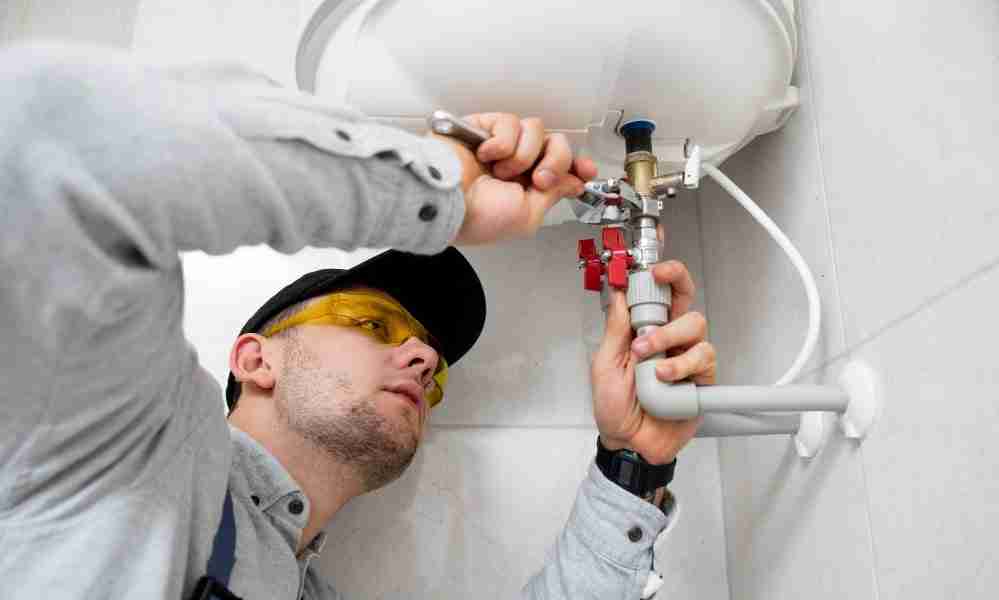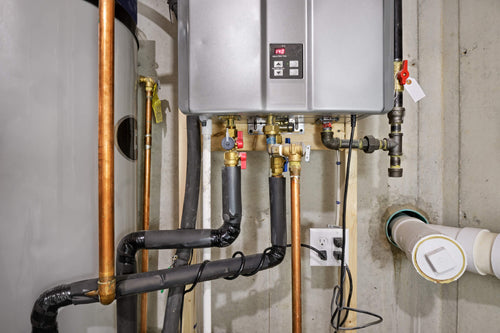Learning About The Advantages Of Continuous-Flow Water Heaters
Learning About The Advantages Of Continuous-Flow Water Heaters
Blog Article
In this article in the next paragraphs you will find some good additional info concerning Pros and Cons of Tankless Water Heater.

In a globe where comfort and performance reign supreme, it's no surprise that house owners are regularly looking for smarter methods to manage their home's power consumption and comfort. One innovation that has steadily gotten popularity is the tankless water heater. But what exactly makes these systems attract attention from the traditional tank-based versions a lot of us grew up with? Let's dive in and discover the advantages of tankless water heaters, aiding you make a decision if it's time to make the switch in your house.
Introduction
Image this: you step into the shower after a lengthy day, expecting a comforting cascade of warm water, only to be welcomed by icy droplets due to the fact that the last individual utilized it all up. Audio familiar? Standard water heaters keep a fixed amount of warm water, meaning you're at the mercy of that storage tank's supply. Tankless systems, on the other hand, heat water on demand. Say goodbye to going out mid-shower, no more fumbling with schedules simply to ensure warm water is offered.
Recognizing Tankless Water Heaters
What Are Tankless Hot Water Heater?
Tankless hot water heater, often known as on-demand or instantaneous water heaters, give hot water only as it's required. Instead of storing gallons of pre-heated water, these units kick right into activity the moment you turn on the faucet. Water travels through a warm exchanger, heating up in real-time, implying you obtain a continuous flow of warm water without the requirement for a huge storage tank sitting lazily by.
Exactly how Do They Vary from Standard Systems?
Standard heaters hold a storage tank of warm water, using power to keep that container at a regular temperature. Tankless devices eliminate the standing supply, minimizing wasted energy and the large impact of a big cyndrical tube. Essentially, you're upgrading from a "stockpile" frame of mind to a "made-to-order" approach.
Usual Types of Tankless Systems
Tankless hot water heater usually come in 2 selections: gas and electric. Gas designs have a tendency to supply higher flow prices, ideal for larger families, while electrical models often serve smaller sized homes and are normally simpler to set up. Additionally, some systems are created for point-of-use (offering one component) while others can take care of the whole home's hot water requirements.
Trick Advantages of Tankless Hot Water Heater
Power Efficiency and Cost Financial Savings
No more heating up a titan container's worth of water and maintaining it toasty all day. Tankless heating systems reduce standby energy losses, which can lower utility bills. While the initial expense might be higher, the long-term cost savings commonly warrant the investment.
3. Space-Saving Style
If your home is short on storage space, eliminating the bulky storage tank maximizes useful space. Tankless units are portable and can usually be installed on walls, concealed in corners, or installed in limited utility closets without monopolizing the whole space.
4. Longer Life expectancy
A well-kept tankless water heater can outlive its tank-based relative. Standard storage tanks could last 10-15 years, while tankless versions can maintain chugging along for two decades or even more, making them a solid investment over time.
1. Limitless Hot Water Supply
Ever had to arrange showers so every person obtains their reasonable share of hot water? With tankless, that ends up being a distant memory. As long as the heater's circulation capability isn't gone beyond, you can take back-to-back showers without becoming a popsicle.
5. Improved Water Quality
Saving water in a storage tank can often lead to debris accumulation or a slightly "off" taste. With tankless systems, fresh water is warmed on the spot, lowering the opportunities of debris build-up and potentially supplying cleaner-tasting water.
Considerations Prior To Changing
Though the advantages are engaging, it's wise to take into consideration a few aspects prior to totally devoting.
Evaluating Your Home's Water Use Patterns
If your house all at once makes use of multiple fixtures with high hot water demand, make certain the system's circulation price meets your requirements. Knowing your use patterns aids you select the appropriate dimension and type of tankless heating unit.
Maintenance and Treatment Tips
Tankless systems are fairly low maintenance, yet they aren't set-it-and-forget-it home appliances.
Regular Cleansing and Descaling
Hard water minerals can accumulate in the warm exchanger, impacting performance. Regular descaling (frequently recommended every year) keeps the system going for peak performance.
Annual Professional Inspections
A yearly checkup from a specialist makes sure minor issues are captured early. They'll assess the device's performance, try to find leakages, and aid maintain optimum performance.
Preliminary Financial Investment Expenses
Tankless heaters commonly include a greater upfront price. In between the device itself and prospective installment adjustments, the first expense could provide you sticker label shock. Yet keep in mind to watch it as a lasting financial investment.
Setup Needs
Depending on your home's facilities, you might need additional electric capacity or gas line upgrades. Guarantee you recognize the installment needs and speak with an expert to stay clear of surprises.
Making Certain Proper Air Flow
For gas versions, correct ventilation is necessary to safely get rid of exhaust gases. Ensure airing vent systems are clean and correctly set up to prevent any type of possible security hazards.
Comparing Different Brands and Designs
Not all tankless water heaters are created equivalent.
Looking Into Reliable Suppliers
Try to find credible brands with a history of producing high quality units. A reliable maker frequently gives far better consumer assistance and longer guarantees.
Installation: DIY or Expert?
While some property owners delight in dealing with projects themselves, tankless setup may not be the best time to break out the toolbox.
Pros and Cons of DIY Installment
A do it yourself mount can save cash, however it includes risks. Wrong installment can cause inefficiency or security concerns. If you come in handy and have experience, it might be feasible-- however proceed with caution.
Reading Testimonials and Individual Comments
Individual reviews and comments from neighbors or pals who have actually gone tankless can use beneficial understandings. Often, real-life experiences can be much more informing than advertising sales brochures.
When to Call a Professional Plumbing Professional
For a lot of, calling a professional ensures every little thing's done appropriately. A professional plumbing professional recognizes regional codes, sizing demands, and venting specifications, decreasing the risk of accidents.
Optimizing Effectiveness
You have actually bought a tankless device-- now optimize its performance.
Optimal Temperature Level Setups
Many people set their systems in between 120-140 F. Adjusting the temperature can improve comfort and savings. Experiment to find a pleasant place that does not waste energy.
Pairing with Low-Flow Fixtures
Intend to extend your device's capacities? Consider installing low-flow showerheads and faucets. They reduce water usage, permitting your tankless system to supply a consistent stream of hot water without straining.
Ecological Influence
Tankless hot water heater align with greener living objectives.
Lowered Carbon Footprint
By using much less power and just home heating water as needed, tankless systems can reduce your home's carbon impact, reducing your ecological effect.
Preserving Natural Resources
Much less power intake and less thrown away warm water equate into less natural deposits being utilized, an environmental win-win.
That Benefits The Majority Of from Tankless Heating units?
The elegance of tankless heating units is that they can match a selection of houses.
Large Households vs. Solitary Occupants
Huge families may love the endless hot water supply, while single occupants appreciate the power savings from not heating an entire tank for simply someone's early morning shower.
House Owners with Restricted Room
If your home is short on square video, losing the cumbersome storage tank maximizes area for other fundamentals-- or maybe simply extra breathing space.
Eco-Conscious Customers
Going tankless aligns with eco-friendly values, guaranteeing you're not losing energy or resources.
Future Fads in Tankless Water Heaters
The world of home devices is ever-evolving, and tankless water heaters are no exemption.
Innovations in Innovation
R&D is continuously boosting warm exchangers, making devices much more reliable and resilient. Future versions may be even quieter, a lot more compact, and much better matched for varying environments.
Smart Home Assimilation
Visualize changing your water heater's temperature using an app or getting upkeep informs on your phone. As wise home tech advancements, we'll see more connectivity and convenience.
Final thought
Picking a tankless hot water heater is more than simply updating your home's hot water system; it's buying long-lasting convenience, energy performance, and a greener way of living. By considering your family's water usage, bearing in mind installment demands, and committing to normal upkeep, you can delight in a steady stream of warm water without the baggage of a large storage tank. As technology develops, you can look forward to also smarter, more reliable tankless remedies that not only make your life less complicated but likewise benefit the planet.
5 Benefits of Tankless Water Heaters
Save Valuable Space
Since tankless water heaters do not have a massive 40+ gallon tank of water, they are considerably smaller and can fit in more narrow spaces in your home.
If you are working with limited square footage, a tankless water heater will still provide you with the hot water you need while taking up significantly less space in your home. While the exact size of a tankless water heater varies depending on the brand, some are as small as a carry-on suitcase.
Endless Supply of Hot Water
While a traditional water heater preheats and stores your water in the tank, tankless water heaters do not rely on a reservoir system.
This means that they do not run out of hot water like traditional water heaters since they make hot water as needed. Traditional water heaters need to stop and reheat water when the tank inevitably runs out, but tankless water heaters do not have this issue.
Provide Warm Water On-Demand
As mentioned above, tankless water heaters do not preheat a certain amount of water and then store it in a massive tank to be used later. An advantage of installing a tankless water heater includes water being heated instantly whenever you turn on the faucet.
When you turn on the water, it will travel through a heat exchanger in the unit and be heated with either an electric element or a natural gas burner. Gone are the days of having to ration out your hot water to make sure that you do not run out.
Longer Life Cycle
Not only do tankless water heaters provide an endless supply of hot water for your home whenever you want it, but these units tend to have a longer lifespan than water heaters with tanks.
Tanked water heaters have an average lifespan of around 10 years, as the tank is prone to corrosion, leading to serious issues. In comparison, tankless water heaters can last for around 15 to 20 years with the proper maintenance and tune-ups.
Energy Efficient
Compared to traditional water heaters, tankless water heaters are a more energy-efficient water heating option for your home. Tank water heaters must heat and reheat the water stored in the tank throughout the day, even if you are not home.
This energy use adds up over time, leading to an increase in your energy bills and added strain on your unit. A benefit of buying a tankless water heater includes saving money since it only operates when you turn on the hot water. Since it only heats up as needed, this can decrease your energy bills and save you money in the long run.
https://callrandazzo.com/blog/5-benefits-of-tankless-water-heaters/

I'm just very involved in Unveiling the Hot Trend: The Benefits of Tankless Water and I'm hoping you enjoyed reading my page. Do you know anybody else who is involved in the niche? Do not hesitate to promote it. We love your readership.
Schedule Now Report this page